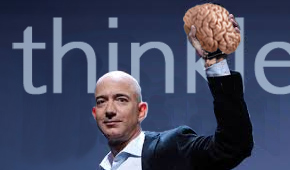Amazon gives up on books, buys customers’ ability to read instead
 Seattle–(BUSINESS LINE)–April 1, 2013– In a not-entirely-surprising move, online retail giant Amazon.com, Inc. (NASDAQ:AMZN) announced today that it had moved its publishing model beyond the distribution of paperback and digital books and has bought its customers’ ability to read.
Seattle–(BUSINESS LINE)–April 1, 2013– In a not-entirely-surprising move, online retail giant Amazon.com, Inc. (NASDAQ:AMZN) announced today that it had moved its publishing model beyond the distribution of paperback and digital books and has bought its customers’ ability to read.
“It’s really just a natural progression of both Amazon’s technological and business goals,” said Ravi Bharathi, professor of neuroscience at Stanford University and author of the now redundant book, You’re Worth What You Know. “Why bother with fussy New York city publishers and clueless retirees uploading their memoirs about vacationing on the Jersey shore when you can cut right to the chase and just buy a stake in your reader’s brain?”
Asked if this bold new initiative by Amazon threatened to impose a debilitating monopoly over other book merchants such as Barnes & Noble, Kobo, Inc., and Smashwords.com, Bharathi appeared confused and said, “Who?”
 An inside source at the Seattle technology company’s research and development division in Seattle, Washington has reported that the customers’ innate ability to read will be monetized by a small digital device mounted on the top of the user’s head. Dubbed the “Thinkle™,” the device will calculate how much the user would typically read based on past purchases, conduct a small electrical charge to the pleasure/pain centers of the brain to simulate the act of reading, then automatically deduct a fee ranging from $.99 to $9.99 from the user’s bank account.
An inside source at the Seattle technology company’s research and development division in Seattle, Washington has reported that the customers’ innate ability to read will be monetized by a small digital device mounted on the top of the user’s head. Dubbed the “Thinkle™,” the device will calculate how much the user would typically read based on past purchases, conduct a small electrical charge to the pleasure/pain centers of the brain to simulate the act of reading, then automatically deduct a fee ranging from $.99 to $9.99 from the user’s bank account.
“No muss, no fuss,” the source said. “You’ll never run out of space. Unless you have a tiny brain. And it gives a whole new meaning to ‘side loading.’”
Asked if the Thinkle™ would charge for a simulation of what were formerly free books on the book seller’s site, the source replied, “Of course not, they were free. Besides, nobody ever read them anyway.”
Wall Street technology forecasters have predicted that the only real competition for “brain space” would come from Apple, Inc., makers of the hugely successful iPhone and iPad line of products.
When reached for comment, however, Apple CEO Timothy Cook laughed. “Worried? Not really. We’ve been piping music into people’s heads since 2002.”
Amazon CEO Jeff Bezos, currently conducting an archaeological dig on the surface of Mars, could not be reached for comment. Happy April Fool’s Day, everyone.









